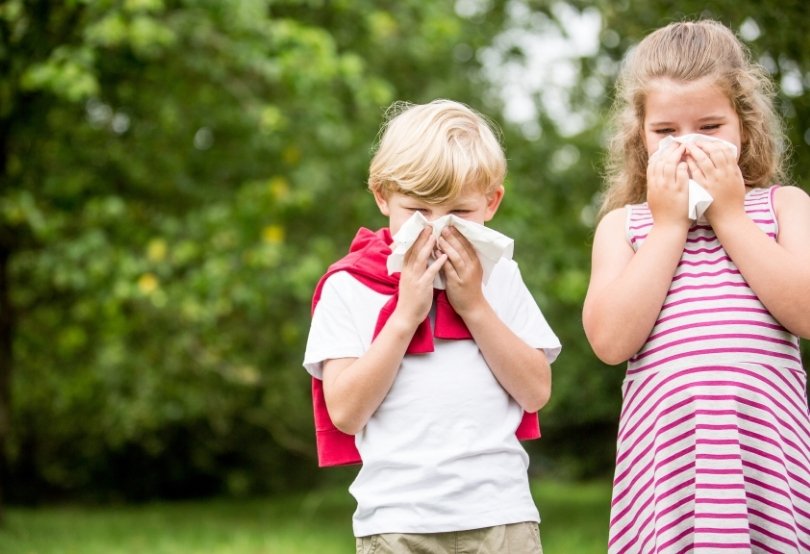
What is Spring Allergy?
Spring allergy, also known as allergic rhinitis or hay fever, is an allergic reaction to airborne substances that are more prevalent during the spring season, particularly pollen from trees, grasses, and weeds. When individuals with spring allergies inhale these allergens, their immune system mistakenly identifies them as harmful and releases chemicals like histamine, which leads to symptoms such as sneezing, runny nose, and itchy eyes.
Spring allergies can affect people of all ages and are a common seasonal issue, with symptoms typically intensifying when pollen levels are at their highest.
What Causes Spring Allergy?
Spring allergies are caused by the immune system’s overreaction to airborne allergens, particularly pollen. During the spring season, trees, grasses, and weeds release pollen into the air as part of their reproductive process. When sensitive individuals inhale these pollen particles, their immune system triggers an allergic response, leading to the symptoms of allergic rhinitis. Common allergens that cause spring allergies include:
– **Tree Pollen:** Pollen from trees such as oak, birch, cedar, and maple is a major cause of spring allergies.
– **Grass Pollen:** Grasses such as ryegrass and timothy grass also release pollen that can trigger allergic reactions.
– **Weed Pollen:** Weeds such as ragweed and sagebrush may continue to release pollen into the air during late spring and early summer.
What Are the Symptoms of Spring Allergy?
The symptoms of spring allergies can vary in severity depending on the individual’s sensitivity to allergens. Common symptoms include:
– Sneezing
– Runny or stuffy nose
– Itchy or watery eyes
– Itchy throat or ears
– Coughing
– Postnasal drip (mucus dripping down the back of the throat)
– Fatigue (due to disrupted sleep caused by symptoms)
In more severe cases, spring allergies can exacerbate asthma symptoms, leading to wheezing, shortness of breath, or chest tightness.
What Are the Risk Factors for Allergic Rhinitis (Spring Allergy)?
Certain factors increase the likelihood of developing spring allergies, including:
– **Family History:** Having a family history of allergies, asthma, or eczema increases the risk of developing allergic rhinitis.
– **Age:** Spring allergies often develop during childhood or early adulthood, though they can appear at any age.
– **Exposure to Allergens:** Frequent exposure to pollen, whether due to outdoor activities, occupational exposure, or geographic location, can increase the risk of spring allergies.
– **Other Allergies or Asthma:** Individuals with other allergic conditions, such as eczema or food allergies, are more likely to develop allergic rhinitis.
How Is Spring Allergy Diagnosed?
Spring allergies are typically diagnosed based on a patient’s medical history, symptoms, and physical examination. A healthcare provider may ask about the timing of symptoms, their severity, and any known triggers. In some cases, additional tests may be conducted to confirm the diagnosis or identify specific allergens. These tests may include:
1- Skin Prick Test
During a skin prick test, small amounts of allergens (such as pollen) are applied to the skin, which is then pricked to allow the allergen to enter. If the patient is allergic, a raised, red bump will appear at the test site.
2- Blood Test
A blood test, such as a specific IgE test, measures the level of antibodies in the blood that react to certain allergens. Elevated levels of IgE antibodies suggest an allergic response.
How Is Spring Allergy Treated?
The treatment of spring allergies focuses on reducing exposure to allergens and managing symptoms. Common treatment methods include:
1- Antihistamines
Antihistamines are commonly used to relieve sneezing, itching, and runny nose by blocking the effects of histamine, a chemical released during an allergic reaction.
2- Nasal Corticosteroids
Nasal corticosteroids reduce inflammation in the nasal passages, helping to relieve congestion and other nasal symptoms. They are often considered one of the most effective treatments for allergic rhinitis.
3- Decongestants
Decongestants help reduce nasal congestion by shrinking the blood vessels in the nasal passages. However, they should not be used for extended periods, as prolonged use can lead to rebound congestion.
4- Immunotherapy
For individuals with severe or persistent spring allergies, immunotherapy (allergy shots) may be recommended. This treatment involves gradually increasing exposure to the allergen over time to desensitize the immune system.
Does Spring Allergy Cause Serious Problems If It Is Not Treated?
While spring allergies are generally not life-threatening, they can significantly impact an individual’s quality of life if left untreated. Persistent symptoms such as nasal congestion, coughing, and fatigue can lead to sleep disturbances, reduced productivity, and increased irritability. In some cases, untreated spring allergies can exacerbate asthma or lead to complications such as sinus infections (sinusitis).
What Are the Ways to Protect Yourself from Spring Allergies?
There are several strategies to reduce exposure to allergens and minimize the impact of spring allergies. These include:
– **Staying Indoors:** Stay indoors during peak pollen times, especially in the morning, and keep windows and doors closed.
– **Using Air Purifiers:** Air purifiers with HEPA filters can help reduce the amount of pollen and other allergens in the air.
– **Wearing Sunglasses and Hats:** Wearing sunglasses and a wide-brimmed hat outdoors can help protect your eyes from pollen exposure.
– **Showering After Outdoor Activities:** Showering and changing clothes after spending time outdoors can help remove pollen from your skin and hair.
– **Cleaning Your Home Regularly:** Vacuuming and dusting frequently can help reduce indoor allergens like dust mites and pet dander.
Frequently Asked Questions About Spring Allergy
Can Spring Allergies Develop Later in Life?
Yes, spring allergies can develop at any age, even in individuals who have never experienced allergies before. Changes in the environment, immune system function, or prolonged exposure to allergens may trigger allergic reactions later in life.
Can Spring Allergies Be Prevented?
While it is not possible to completely prevent spring allergies, symptoms can be managed by avoiding allergens, using medications, and following preventive measures such as staying indoors during peak pollen times and using air purifiers.
Why Choose Us?
Our clinic specializes in allergies and allergy testing, and we stand out in the field of health tourism with the high standards of service we provide. Here are the key reasons why you should choose us:
Expert Doctor Team
At our clinic, we have highly experienced doctors at the professor level who are experts in the field of allergies. With years of experience in allergy treatment and testing, we provide the most accurate diagnosis and treatment processes. Our professor is skilled in managing even the most complex allergy cases and delivering the most effective solutions.
Cutting-Edge Allergy Tests
Your health is our top priority. In our clinic, we use state-of-the-art allergy testing technologies that are recognized globally. This allows us to obtain the most accurate and rapid results, ensuring that your treatment plans are created in the best possible way. Our tests are conducted according to international standards.
Comfort and Luxury Services
We don’t just focus on treatment; we also aim to provide a comfortable experience. During your treatment, we offer five-star hotel accommodations to ensure you feel at home throughout the process. Your comfort is guaranteed with the luxurious services we provide.
Transfer and Transportation Convenience
For patients coming from abroad or from other cities, we offer VIP transfer services. From the airport to our clinic, and from our clinic to your hotel, we are with you every step of the way. We take care of every detail to ensure your comfort and safety.
Personalized Approach
Every patient’s health condition is unique, and we tailor our solutions to meet each individual’s specific needs. Throughout your treatment process, we stay closely connected with you, and our professional team is by your side every step of the way.






